In-depth Report: Management Principles, Teamwork, and Motivation
VerifiedAdded on 2023/06/09
|7
|1970
|404
Report
AI Summary
This report provides a comprehensive overview of management principles, contrasting traditional and contemporary approaches, and delves into teamwork and motivational theories. It reflects on personal experiences and education gained over several weeks, analyzing the differences between traditional and contemporary management styles, emphasizing the shift towards networking, collaboration, and the integration of personal and business involvement. The report also examines teamwork through Tuckman's and Lencioni's models, highlighting the importance of trust, commitment, and accountability within teams. Furthermore, it explores motivational theories, such as Maslow's hierarchy of needs and Herzberg's two-factor theory, to understand how to effectively motivate employees and enhance job satisfaction. The analysis includes a self-assessment using the Competing Values Framework to identify areas for personal and professional development, concluding that the application of these management principles enhances operational efficiency and fosters a smoother functioning within organizations. Desklib provides access to this and many other solved assignments.
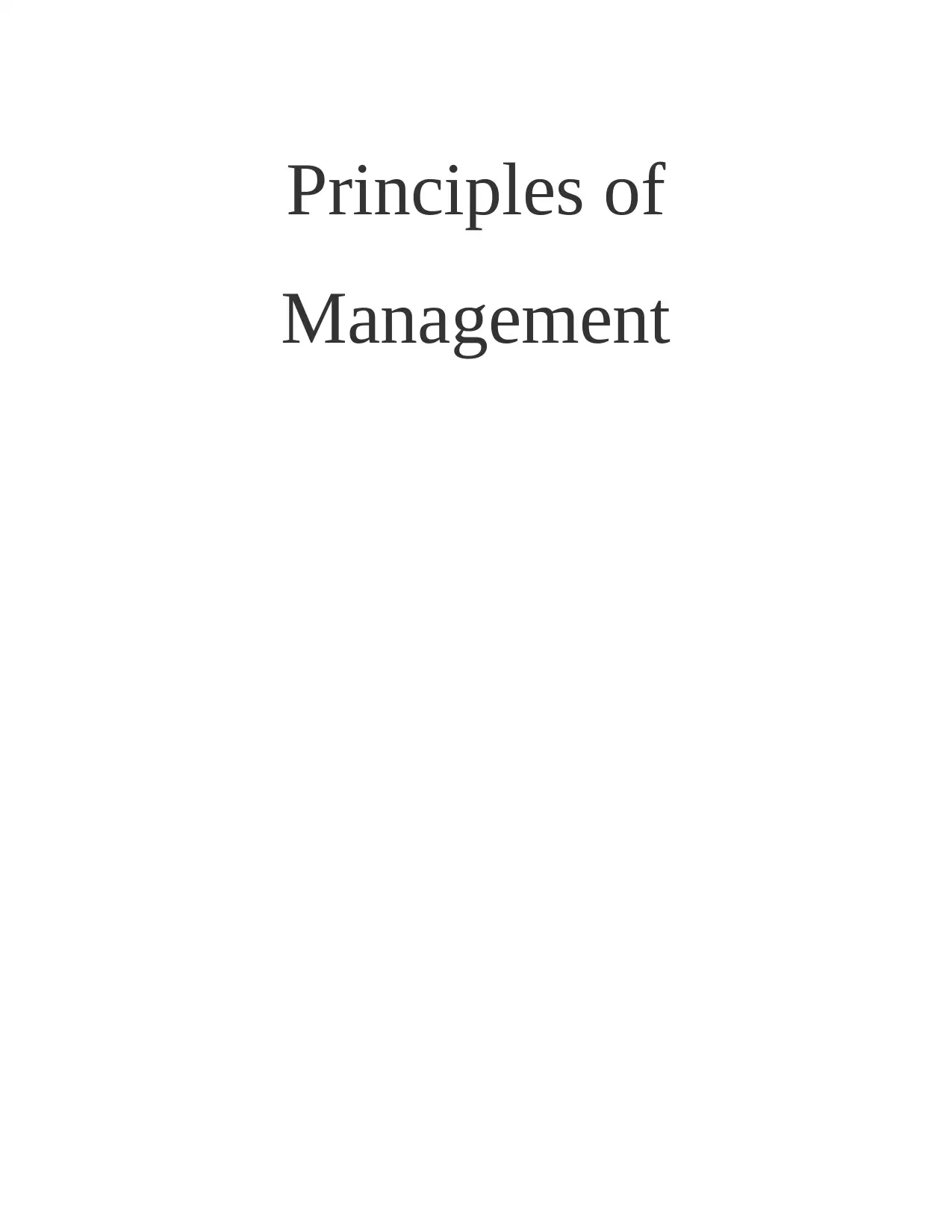
Principles of
Management
Management
Paraphrase This Document
Need a fresh take? Get an instant paraphrase of this document with our AI Paraphraser
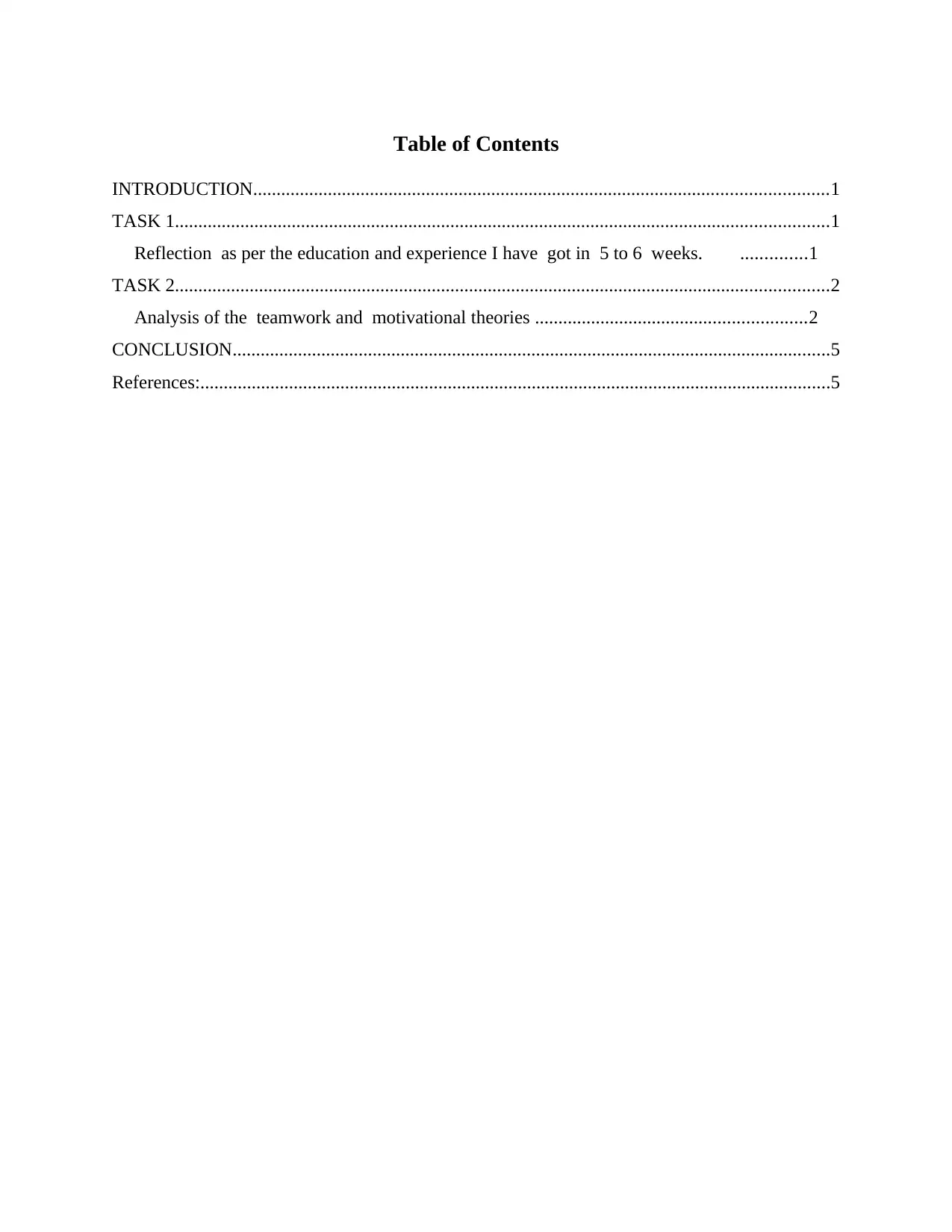
Table of Contents
INTRODUCTION...........................................................................................................................1
TASK 1............................................................................................................................................1
Reflection as per the education and experience I have got in 5 to 6 weeks. ..............1
TASK 2............................................................................................................................................2
Analysis of the teamwork and motivational theories ..........................................................2
CONCLUSION................................................................................................................................5
References:.......................................................................................................................................5
INTRODUCTION...........................................................................................................................1
TASK 1............................................................................................................................................1
Reflection as per the education and experience I have got in 5 to 6 weeks. ..............1
TASK 2............................................................................................................................................2
Analysis of the teamwork and motivational theories ..........................................................2
CONCLUSION................................................................................................................................5
References:.......................................................................................................................................5
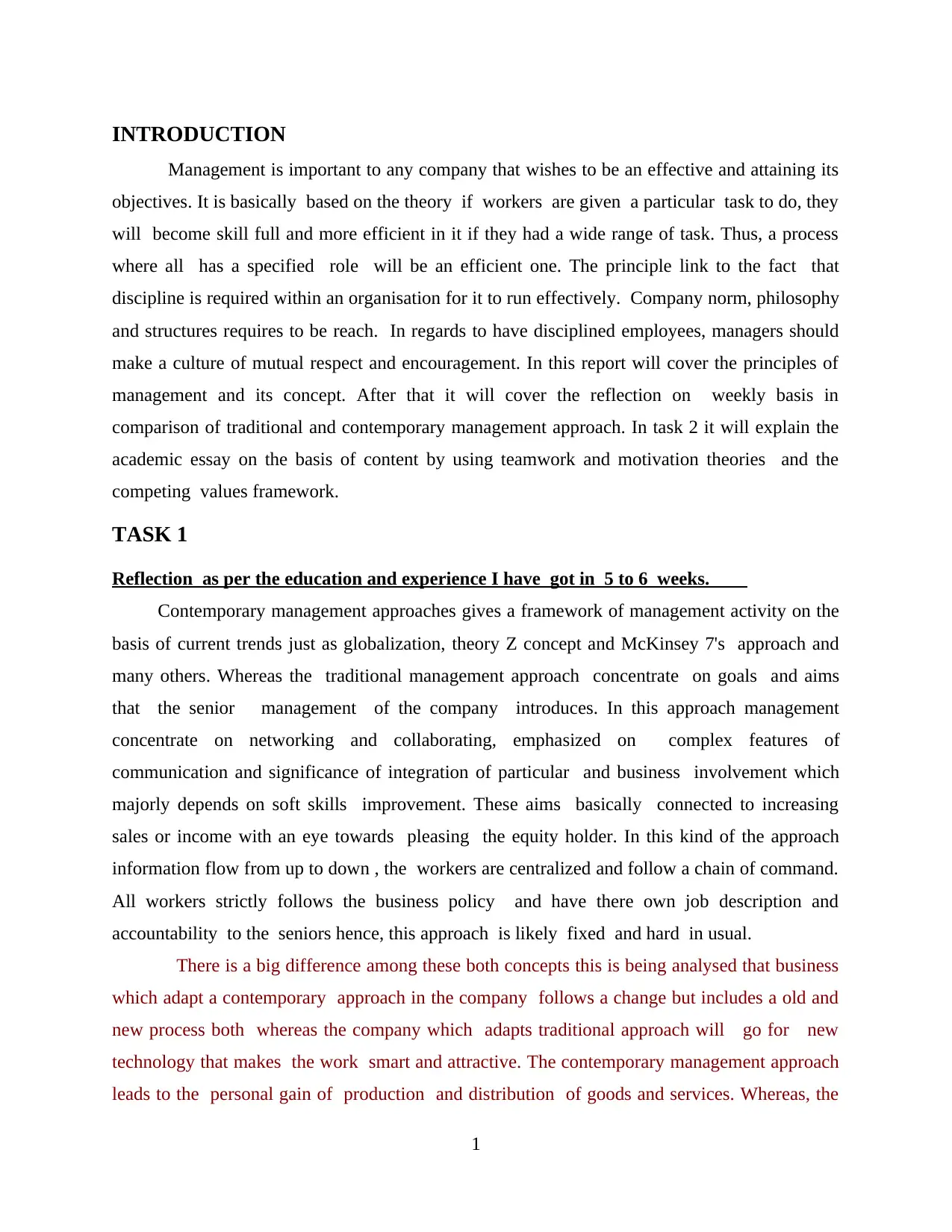
INTRODUCTION
Management is important to any company that wishes to be an effective and attaining its
objectives. It is basically based on the theory if workers are given a particular task to do, they
will become skill full and more efficient in it if they had a wide range of task. Thus, a process
where all has a specified role will be an efficient one. The principle link to the fact that
discipline is required within an organisation for it to run effectively. Company norm, philosophy
and structures requires to be reach. In regards to have disciplined employees, managers should
make a culture of mutual respect and encouragement. In this report will cover the principles of
management and its concept. After that it will cover the reflection on weekly basis in
comparison of traditional and contemporary management approach. In task 2 it will explain the
academic essay on the basis of content by using teamwork and motivation theories and the
competing values framework.
TASK 1
Reflection as per the education and experience I have got in 5 to 6 weeks.
Contemporary management approaches gives a framework of management activity on the
basis of current trends just as globalization, theory Z concept and McKinsey 7's approach and
many others. Whereas the traditional management approach concentrate on goals and aims
that the senior management of the company introduces. In this approach management
concentrate on networking and collaborating, emphasized on complex features of
communication and significance of integration of particular and business involvement which
majorly depends on soft skills improvement. These aims basically connected to increasing
sales or income with an eye towards pleasing the equity holder. In this kind of the approach
information flow from up to down , the workers are centralized and follow a chain of command.
All workers strictly follows the business policy and have there own job description and
accountability to the seniors hence, this approach is likely fixed and hard in usual.
There is a big difference among these both concepts this is being analysed that business
which adapt a contemporary approach in the company follows a change but includes a old and
new process both whereas the company which adapts traditional approach will go for new
technology that makes the work smart and attractive. The contemporary management approach
leads to the personal gain of production and distribution of goods and services. Whereas, the
1
Management is important to any company that wishes to be an effective and attaining its
objectives. It is basically based on the theory if workers are given a particular task to do, they
will become skill full and more efficient in it if they had a wide range of task. Thus, a process
where all has a specified role will be an efficient one. The principle link to the fact that
discipline is required within an organisation for it to run effectively. Company norm, philosophy
and structures requires to be reach. In regards to have disciplined employees, managers should
make a culture of mutual respect and encouragement. In this report will cover the principles of
management and its concept. After that it will cover the reflection on weekly basis in
comparison of traditional and contemporary management approach. In task 2 it will explain the
academic essay on the basis of content by using teamwork and motivation theories and the
competing values framework.
TASK 1
Reflection as per the education and experience I have got in 5 to 6 weeks.
Contemporary management approaches gives a framework of management activity on the
basis of current trends just as globalization, theory Z concept and McKinsey 7's approach and
many others. Whereas the traditional management approach concentrate on goals and aims
that the senior management of the company introduces. In this approach management
concentrate on networking and collaborating, emphasized on complex features of
communication and significance of integration of particular and business involvement which
majorly depends on soft skills improvement. These aims basically connected to increasing
sales or income with an eye towards pleasing the equity holder. In this kind of the approach
information flow from up to down , the workers are centralized and follow a chain of command.
All workers strictly follows the business policy and have there own job description and
accountability to the seniors hence, this approach is likely fixed and hard in usual.
There is a big difference among these both concepts this is being analysed that business
which adapt a contemporary approach in the company follows a change but includes a old and
new process both whereas the company which adapts traditional approach will go for new
technology that makes the work smart and attractive. The contemporary management approach
leads to the personal gain of production and distribution of goods and services. Whereas, the
1
⊘ This is a preview!⊘
Do you want full access?
Subscribe today to unlock all pages.

Trusted by 1+ million students worldwide
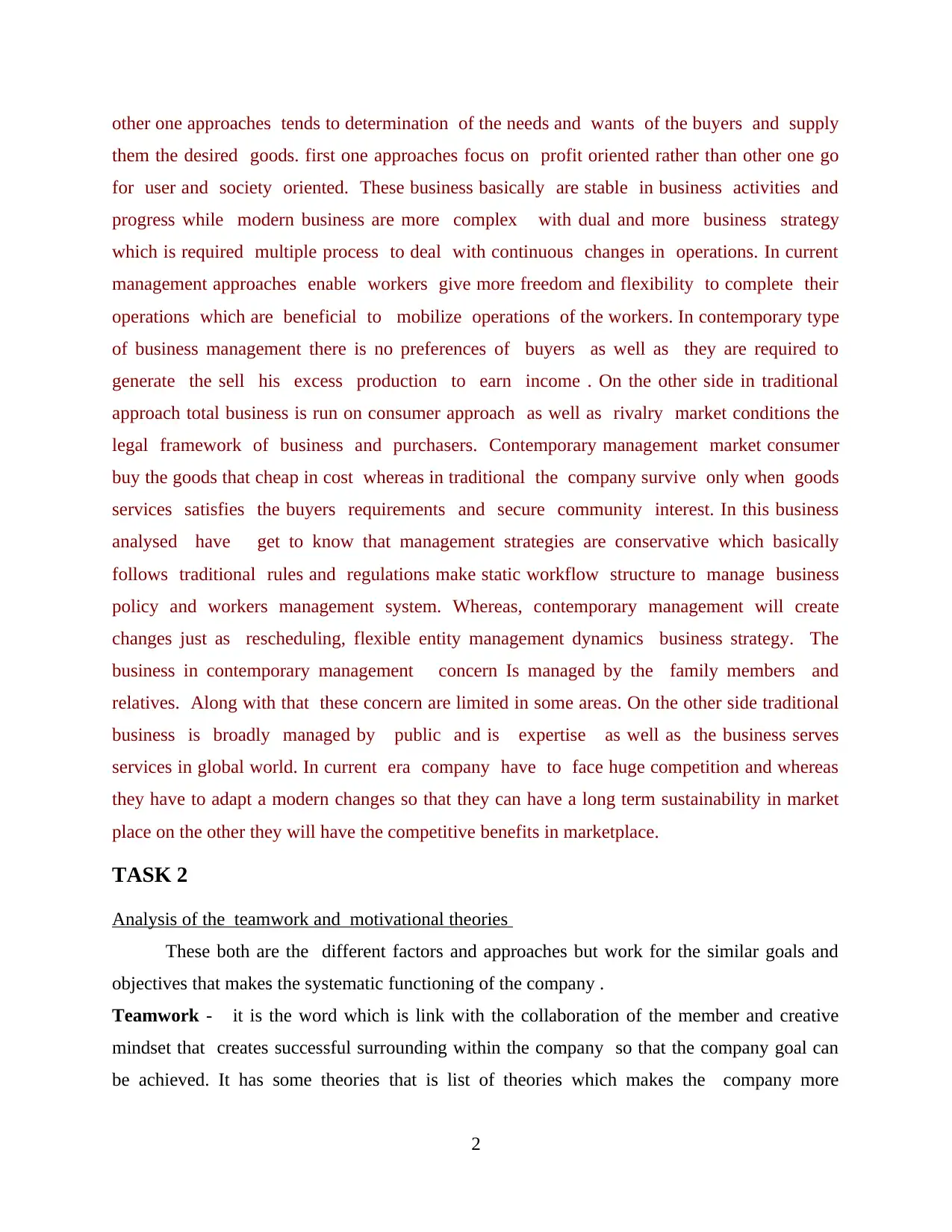
other one approaches tends to determination of the needs and wants of the buyers and supply
them the desired goods. first one approaches focus on profit oriented rather than other one go
for user and society oriented. These business basically are stable in business activities and
progress while modern business are more complex with dual and more business strategy
which is required multiple process to deal with continuous changes in operations. In current
management approaches enable workers give more freedom and flexibility to complete their
operations which are beneficial to mobilize operations of the workers. In contemporary type
of business management there is no preferences of buyers as well as they are required to
generate the sell his excess production to earn income . On the other side in traditional
approach total business is run on consumer approach as well as rivalry market conditions the
legal framework of business and purchasers. Contemporary management market consumer
buy the goods that cheap in cost whereas in traditional the company survive only when goods
services satisfies the buyers requirements and secure community interest. In this business
analysed have get to know that management strategies are conservative which basically
follows traditional rules and regulations make static workflow structure to manage business
policy and workers management system. Whereas, contemporary management will create
changes just as rescheduling, flexible entity management dynamics business strategy. The
business in contemporary management concern Is managed by the family members and
relatives. Along with that these concern are limited in some areas. On the other side traditional
business is broadly managed by public and is expertise as well as the business serves
services in global world. In current era company have to face huge competition and whereas
they have to adapt a modern changes so that they can have a long term sustainability in market
place on the other they will have the competitive benefits in marketplace.
TASK 2
Analysis of the teamwork and motivational theories
These both are the different factors and approaches but work for the similar goals and
objectives that makes the systematic functioning of the company .
Teamwork - it is the word which is link with the collaboration of the member and creative
mindset that creates successful surrounding within the company so that the company goal can
be achieved. It has some theories that is list of theories which makes the company more
2
them the desired goods. first one approaches focus on profit oriented rather than other one go
for user and society oriented. These business basically are stable in business activities and
progress while modern business are more complex with dual and more business strategy
which is required multiple process to deal with continuous changes in operations. In current
management approaches enable workers give more freedom and flexibility to complete their
operations which are beneficial to mobilize operations of the workers. In contemporary type
of business management there is no preferences of buyers as well as they are required to
generate the sell his excess production to earn income . On the other side in traditional
approach total business is run on consumer approach as well as rivalry market conditions the
legal framework of business and purchasers. Contemporary management market consumer
buy the goods that cheap in cost whereas in traditional the company survive only when goods
services satisfies the buyers requirements and secure community interest. In this business
analysed have get to know that management strategies are conservative which basically
follows traditional rules and regulations make static workflow structure to manage business
policy and workers management system. Whereas, contemporary management will create
changes just as rescheduling, flexible entity management dynamics business strategy. The
business in contemporary management concern Is managed by the family members and
relatives. Along with that these concern are limited in some areas. On the other side traditional
business is broadly managed by public and is expertise as well as the business serves
services in global world. In current era company have to face huge competition and whereas
they have to adapt a modern changes so that they can have a long term sustainability in market
place on the other they will have the competitive benefits in marketplace.
TASK 2
Analysis of the teamwork and motivational theories
These both are the different factors and approaches but work for the similar goals and
objectives that makes the systematic functioning of the company .
Teamwork - it is the word which is link with the collaboration of the member and creative
mindset that creates successful surrounding within the company so that the company goal can
be achieved. It has some theories that is list of theories which makes the company more
2
Paraphrase This Document
Need a fresh take? Get an instant paraphrase of this document with our AI Paraphraser
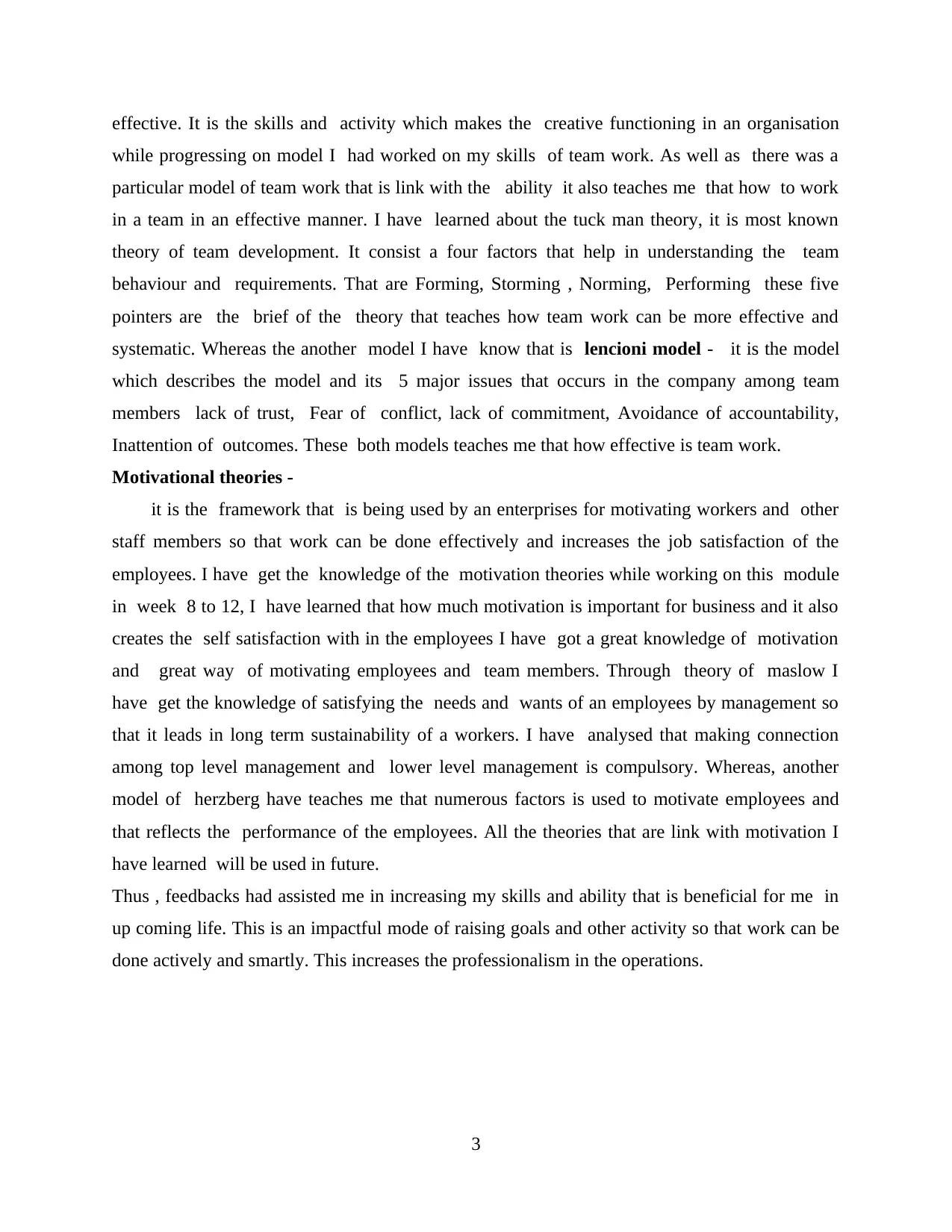
effective. It is the skills and activity which makes the creative functioning in an organisation
while progressing on model I had worked on my skills of team work. As well as there was a
particular model of team work that is link with the ability it also teaches me that how to work
in a team in an effective manner. I have learned about the tuck man theory, it is most known
theory of team development. It consist a four factors that help in understanding the team
behaviour and requirements. That are Forming, Storming , Norming, Performing these five
pointers are the brief of the theory that teaches how team work can be more effective and
systematic. Whereas the another model I have know that is lencioni model - it is the model
which describes the model and its 5 major issues that occurs in the company among team
members lack of trust, Fear of conflict, lack of commitment, Avoidance of accountability,
Inattention of outcomes. These both models teaches me that how effective is team work.
Motivational theories -
it is the framework that is being used by an enterprises for motivating workers and other
staff members so that work can be done effectively and increases the job satisfaction of the
employees. I have get the knowledge of the motivation theories while working on this module
in week 8 to 12, I have learned that how much motivation is important for business and it also
creates the self satisfaction with in the employees I have got a great knowledge of motivation
and great way of motivating employees and team members. Through theory of maslow I
have get the knowledge of satisfying the needs and wants of an employees by management so
that it leads in long term sustainability of a workers. I have analysed that making connection
among top level management and lower level management is compulsory. Whereas, another
model of herzberg have teaches me that numerous factors is used to motivate employees and
that reflects the performance of the employees. All the theories that are link with motivation I
have learned will be used in future.
Thus , feedbacks had assisted me in increasing my skills and ability that is beneficial for me in
up coming life. This is an impactful mode of raising goals and other activity so that work can be
done actively and smartly. This increases the professionalism in the operations.
3
while progressing on model I had worked on my skills of team work. As well as there was a
particular model of team work that is link with the ability it also teaches me that how to work
in a team in an effective manner. I have learned about the tuck man theory, it is most known
theory of team development. It consist a four factors that help in understanding the team
behaviour and requirements. That are Forming, Storming , Norming, Performing these five
pointers are the brief of the theory that teaches how team work can be more effective and
systematic. Whereas the another model I have know that is lencioni model - it is the model
which describes the model and its 5 major issues that occurs in the company among team
members lack of trust, Fear of conflict, lack of commitment, Avoidance of accountability,
Inattention of outcomes. These both models teaches me that how effective is team work.
Motivational theories -
it is the framework that is being used by an enterprises for motivating workers and other
staff members so that work can be done effectively and increases the job satisfaction of the
employees. I have get the knowledge of the motivation theories while working on this module
in week 8 to 12, I have learned that how much motivation is important for business and it also
creates the self satisfaction with in the employees I have got a great knowledge of motivation
and great way of motivating employees and team members. Through theory of maslow I
have get the knowledge of satisfying the needs and wants of an employees by management so
that it leads in long term sustainability of a workers. I have analysed that making connection
among top level management and lower level management is compulsory. Whereas, another
model of herzberg have teaches me that numerous factors is used to motivate employees and
that reflects the performance of the employees. All the theories that are link with motivation I
have learned will be used in future.
Thus , feedbacks had assisted me in increasing my skills and ability that is beneficial for me in
up coming life. This is an impactful mode of raising goals and other activity so that work can be
done actively and smartly. This increases the professionalism in the operations.
3
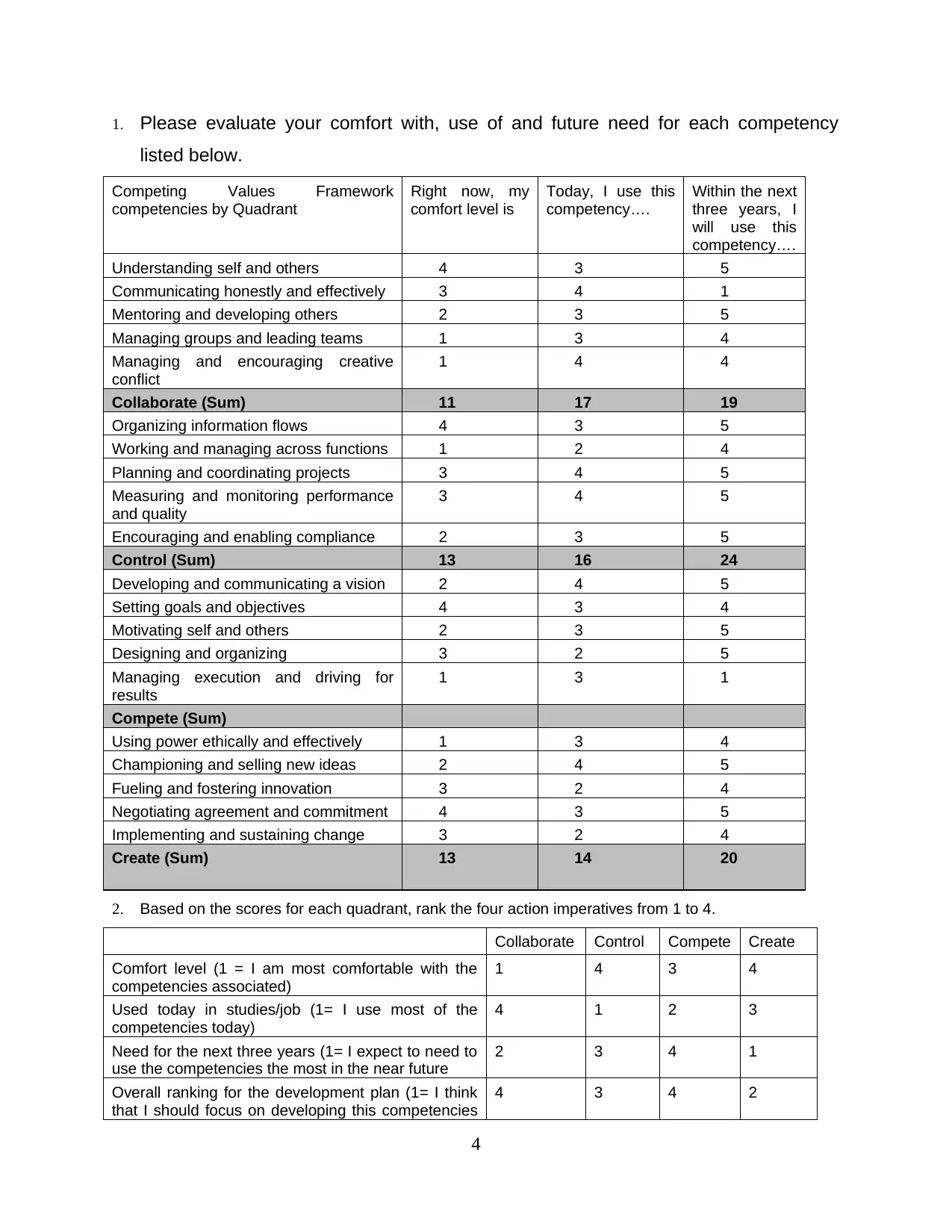
1. Please evaluate your comfort with, use of and future need for each competency
listed below.
Competing Values Framework
competencies by Quadrant
Right now, my
comfort level is
Today, I use this
competency….
Within the next
three years, I
will use this
competency….
Understanding self and others 4 3 5
Communicating honestly and effectively 3 4 1
Mentoring and developing others 2 3 5
Managing groups and leading teams 1 3 4
Managing and encouraging creative
conflict
1 4 4
Collaborate (Sum) 11 17 19
Organizing information flows 4 3 5
Working and managing across functions 1 2 4
Planning and coordinating projects 3 4 5
Measuring and monitoring performance
and quality
3 4 5
Encouraging and enabling compliance 2 3 5
Control (Sum) 13 16 24
Developing and communicating a vision 2 4 5
Setting goals and objectives 4 3 4
Motivating self and others 2 3 5
Designing and organizing 3 2 5
Managing execution and driving for
results
1 3 1
Compete (Sum)
Using power ethically and effectively 1 3 4
Championing and selling new ideas 2 4 5
Fueling and fostering innovation 3 2 4
Negotiating agreement and commitment 4 3 5
Implementing and sustaining change 3 2 4
Create (Sum) 13 14 20
2. Based on the scores for each quadrant, rank the four action imperatives from 1 to 4.
Collaborate Control Compete Create
Comfort level (1 = I am most comfortable with the
competencies associated)
1 4 3 4
Used today in studies/job (1= I use most of the
competencies today)
4 1 2 3
Need for the next three years (1= I expect to need to
use the competencies the most in the near future
2 3 4 1
Overall ranking for the development plan (1= I think
that I should focus on developing this competencies
4 3 4 2
4
listed below.
Competing Values Framework
competencies by Quadrant
Right now, my
comfort level is
Today, I use this
competency….
Within the next
three years, I
will use this
competency….
Understanding self and others 4 3 5
Communicating honestly and effectively 3 4 1
Mentoring and developing others 2 3 5
Managing groups and leading teams 1 3 4
Managing and encouraging creative
conflict
1 4 4
Collaborate (Sum) 11 17 19
Organizing information flows 4 3 5
Working and managing across functions 1 2 4
Planning and coordinating projects 3 4 5
Measuring and monitoring performance
and quality
3 4 5
Encouraging and enabling compliance 2 3 5
Control (Sum) 13 16 24
Developing and communicating a vision 2 4 5
Setting goals and objectives 4 3 4
Motivating self and others 2 3 5
Designing and organizing 3 2 5
Managing execution and driving for
results
1 3 1
Compete (Sum)
Using power ethically and effectively 1 3 4
Championing and selling new ideas 2 4 5
Fueling and fostering innovation 3 2 4
Negotiating agreement and commitment 4 3 5
Implementing and sustaining change 3 2 4
Create (Sum) 13 14 20
2. Based on the scores for each quadrant, rank the four action imperatives from 1 to 4.
Collaborate Control Compete Create
Comfort level (1 = I am most comfortable with the
competencies associated)
1 4 3 4
Used today in studies/job (1= I use most of the
competencies today)
4 1 2 3
Need for the next three years (1= I expect to need to
use the competencies the most in the near future
2 3 4 1
Overall ranking for the development plan (1= I think
that I should focus on developing this competencies
4 3 4 2
4
⊘ This is a preview!⊘
Do you want full access?
Subscribe today to unlock all pages.

Trusted by 1+ million students worldwide
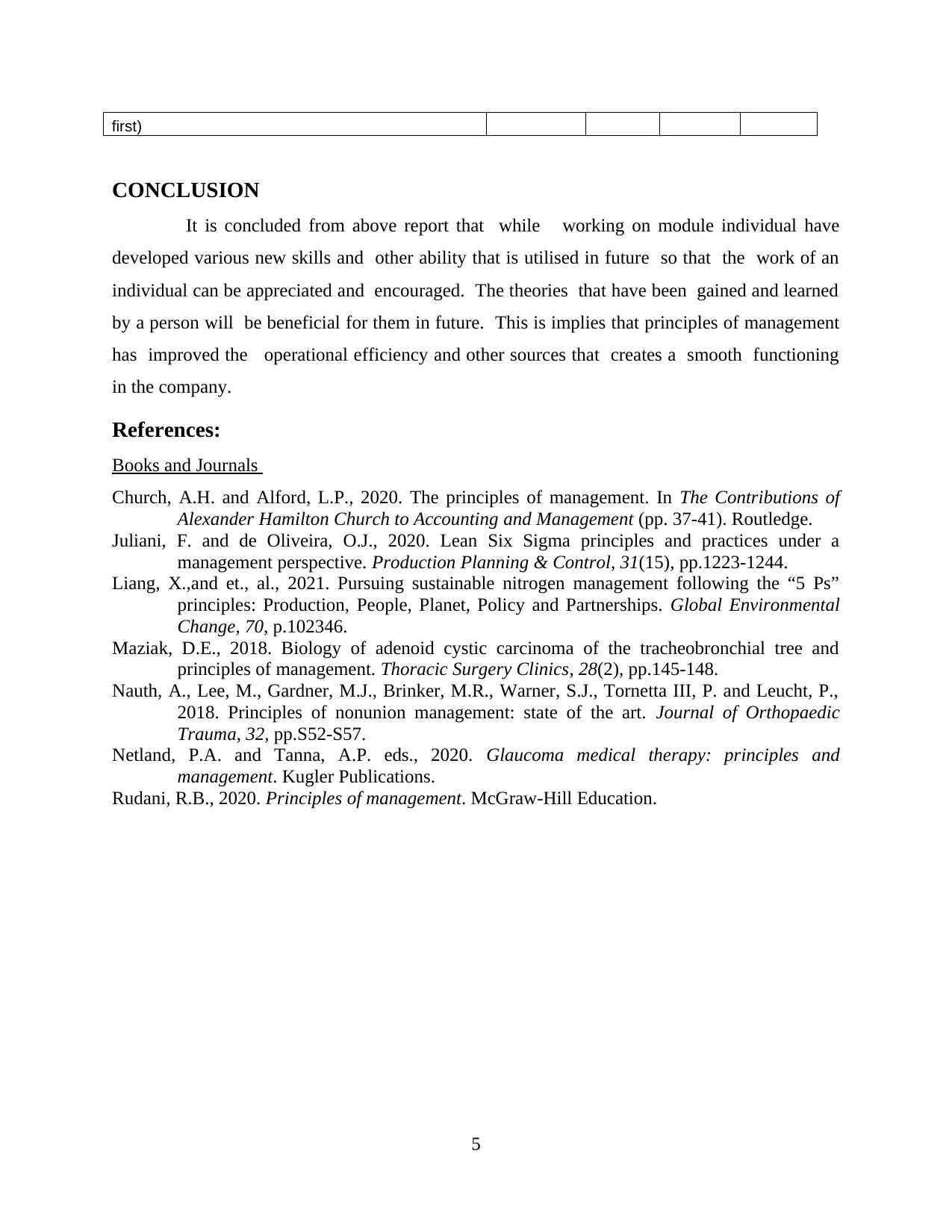
first)
CONCLUSION
It is concluded from above report that while working on module individual have
developed various new skills and other ability that is utilised in future so that the work of an
individual can be appreciated and encouraged. The theories that have been gained and learned
by a person will be beneficial for them in future. This is implies that principles of management
has improved the operational efficiency and other sources that creates a smooth functioning
in the company.
References:
Books and Journals
Church, A.H. and Alford, L.P., 2020. The principles of management. In The Contributions of
Alexander Hamilton Church to Accounting and Management (pp. 37-41). Routledge.
Juliani, F. and de Oliveira, O.J., 2020. Lean Six Sigma principles and practices under a
management perspective. Production Planning & Control, 31(15), pp.1223-1244.
Liang, X.,and et., al., 2021. Pursuing sustainable nitrogen management following the “5 Ps”
principles: Production, People, Planet, Policy and Partnerships. Global Environmental
Change, 70, p.102346.
Maziak, D.E., 2018. Biology of adenoid cystic carcinoma of the tracheobronchial tree and
principles of management. Thoracic Surgery Clinics, 28(2), pp.145-148.
Nauth, A., Lee, M., Gardner, M.J., Brinker, M.R., Warner, S.J., Tornetta III, P. and Leucht, P.,
2018. Principles of nonunion management: state of the art. Journal of Orthopaedic
Trauma, 32, pp.S52-S57.
Netland, P.A. and Tanna, A.P. eds., 2020. Glaucoma medical therapy: principles and
management. Kugler Publications.
Rudani, R.B., 2020. Principles of management. McGraw-Hill Education.
5
CONCLUSION
It is concluded from above report that while working on module individual have
developed various new skills and other ability that is utilised in future so that the work of an
individual can be appreciated and encouraged. The theories that have been gained and learned
by a person will be beneficial for them in future. This is implies that principles of management
has improved the operational efficiency and other sources that creates a smooth functioning
in the company.
References:
Books and Journals
Church, A.H. and Alford, L.P., 2020. The principles of management. In The Contributions of
Alexander Hamilton Church to Accounting and Management (pp. 37-41). Routledge.
Juliani, F. and de Oliveira, O.J., 2020. Lean Six Sigma principles and practices under a
management perspective. Production Planning & Control, 31(15), pp.1223-1244.
Liang, X.,and et., al., 2021. Pursuing sustainable nitrogen management following the “5 Ps”
principles: Production, People, Planet, Policy and Partnerships. Global Environmental
Change, 70, p.102346.
Maziak, D.E., 2018. Biology of adenoid cystic carcinoma of the tracheobronchial tree and
principles of management. Thoracic Surgery Clinics, 28(2), pp.145-148.
Nauth, A., Lee, M., Gardner, M.J., Brinker, M.R., Warner, S.J., Tornetta III, P. and Leucht, P.,
2018. Principles of nonunion management: state of the art. Journal of Orthopaedic
Trauma, 32, pp.S52-S57.
Netland, P.A. and Tanna, A.P. eds., 2020. Glaucoma medical therapy: principles and
management. Kugler Publications.
Rudani, R.B., 2020. Principles of management. McGraw-Hill Education.
5
1 out of 7
Related Documents
Your All-in-One AI-Powered Toolkit for Academic Success.
+13062052269
info@desklib.com
Available 24*7 on WhatsApp / Email
![[object Object]](/_next/static/media/star-bottom.7253800d.svg)
Unlock your academic potential
Copyright © 2020–2026 A2Z Services. All Rights Reserved. Developed and managed by ZUCOL.



